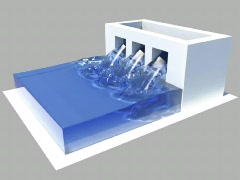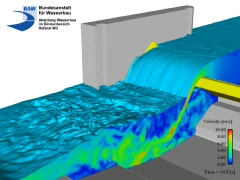|
Overview
NaSt3DGPF is an implementation of a solver for the incompressible Navier-Stokes equations in three dimensions. It allows the realistic simulation of two-phase flows with free surfaces. NaSt3DGPF exhibits the following features:
- Simulation of two-phase flow is implemented with a level-set approach
- Surface tension forces are implemented with the continuum surface force method
- Simulation of turbulence is based on a large-eddy approach (Smagorinsky model)
- Convective terms can be discretized with higher order ENO and WENO schemes
- spatial discretization by 2nd order finite differences on a rectangular, non-uniform, staggered mesh
- convective term: higher order upwind schemes (VONOS, SMART), central differences (2nd order), simple upwind (1st order)
- 2nd order Adams-Bashforth scheme for the time discretization
- boundary conditions: slip, no slip, periodic, inflow, outflow (Neumann, convective, natural)
- (passive) advection-diffusion transport model for concentration of species
- Boussinesq advection-diffusion transport model for temperature
- handling of complex geometries by a simple cell decomposition/enumeration technique
- BiCGStab and SOR iterative solver for pressure Poisson equation (lexicographical, red-black, colored red-black)
- parallelization by means of 3D domain decomposition with good communication/work ratio heuristics
- parallelization based on MPI
- implemented in C++
- various import/export formats, including architecture independent ones and for the VTK graphics library
- macro language for easy problem description
Much emphasis is laid on the point that also complex problems, such
as flows around complicated geometries, can be defined in a clear
and easy way to obtain numerical results rapidly. To this end, there
is a simple macro-language with a few but powerful and meaningful
key-words to describe the flow configuration. This allows the user
to
- build complex geometries by union, intersection, subtraction
of CSG (Constructive Solid Geometry) primitives using shape
parameters independent on the discretization
- describe the computational mesh in a simple way
- define various parameters, e.g. Reynolds number, stopping
value for iterative solver, upwind parameter, etc.
Have a look at the Gallery for movies of simulation results obtained with NaSt3DGPF.
A list of projects which use NaSt3DGPF as the primary toolkit for numerical simulation of two-phase flow is available here.
|




|
Licensing
|
For non-profit usage, the software package NaSt3DGPF can be obtained here after registration.
|
|
|
|
|
|